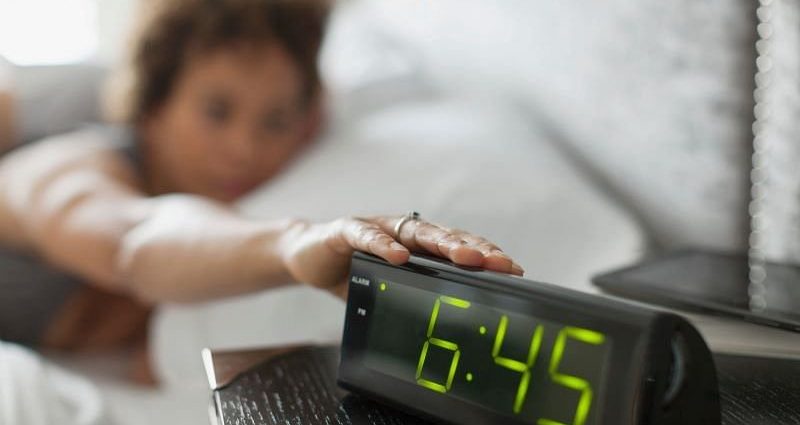MONDAY, Oct. 23, 2023 (HealthDay News) — The expression “you snooze, you lose” may have given reluctant morning risers a bad rap. New research suggests folks who hit the snooze button on their alarm clock may actually reap a rise-and-shine gain.
Snoozing appears to boost your ability to think quickly and clearly upon waking for the day, said Tina Sundelin, lead author of a study from Sweden.
This is especially true for folks who experience sleep inertia — a feeling of drowsiness upon waking, said Sundelin, an assistant professor of psychology at Stockholm University.
“If you are someone who has a lot of sleep inertia — which is common in evening (night owl) people, for example — it can take up to an hour to feel like you’re fully awake,” she noted. But “if some of that time is spent snoozing in lighter sleep, you may get up already having fought some of the inertia.”
Her team found that snoozing is common, with nearly seven in 10 adults hitting the snooze button on their alarm at least some of the time.
The study was published Oct. 17 in the Journal of Sleep Research. It assessed the waking habits of more than 1,700 adults.
Nearly 1,200 of the participants said they sometimes set multiple alarms for their morning rise, and/or hit the alarm snooze button.
On average, those who snoozed said they did so for about 22 minutes.
Those who routinely pressed the snooze button were generally younger, tended to go to bed relatively late each night, and slept less overall. They were also more likely to feel drowsy in the morning, the investigators found.
The team then conducted a second smaller study involving 31 routine snoozers.
Participants spent two nights in a sleep lab. One of the mornings all were permitted to snooze for a half hour before waking up. No snoozing was allowed the other morning.
While intermittent snoozing did interfere with sleep quality, participants were able to log 20 minutes of extra sleep (on average) during their half hour of snoozing.
Sundelin and her colleagues found there were things snoozing did not do. For example, it had no appreciable impact on levels of cortisol, the fight-or-flight hormone. It also had no effect on mood.
But snoozing did appear to have some upsides, said Sundelin. She noted that snoozing seemed to reduce the risk for waking directly from a “very drowsy” deep state of sleep. And snoozing also appeared to enhance the ability to think quickly immediately after getting out of bed.
Still, she cautioned that while snoozers did perform better on thinking (cognition) tests just after waking up, “the effect was rather small.”
That likely means that it’s not the case “that the longer you snooze the better you’ll do,” Sundelin said. “At some point the negatives of the disturbed sleep (while snoozing) would probably outweigh the benefits of the slow wake-up.”
She also pointed out that the sample of study participants is not necessarily representative of all sleepers since all were regular snoozers.
Still, “a lot of people definitely snooze,” Sundelin stressed. And the common criticism that snoozing “fragments your sleep and likely causes shortened sleep duration” probably doesn’t hold up when overall snoozing is kept to a half hour or so, she added.
Adam Krause is a post-doctoral research fellow of psychiatry and behavioral sciences at Stanford University.
Upon reviewing the findings, Krause cautioned that “it’s not so simple to say that snoozing is beneficial for cognitive (thinking) performance.”
For one thing, he said, sleep during a snooze is not as good as undisturbed sleep. And while the Swedish team linked snoozing to a small short-term boost in thinking, he said “it’s not demonstrated in this study whether these effects persist throughout the day.”
The way he sees it, any benefit associated with a half-hour of snoozing “may be outweighed by the overall improvement of sleep quality” associated with simply staying asleep through that same half-hour.
“Personally,” said Krause, “I would also not necessarily recommend snoozing as a behavior, based on these results.”
More information
There’s more on snoozing at the Cleveland Clinic.
SOURCES: Tina Sundelin, PhD. researcher and assistant professor, psychology, Stockholm University, Stockholm, Sweden; Adam J. Krause, PhD, post-doctoral research fellow, computational psychiatry, neuroimaging, and sleep lab, psychiatry and behavioral sciences, Stanford University, Palo Alto, Calif.; Oct. 17, 2023, Journal of Sleep Research
Copyright © 2026 HealthDay. All rights reserved.

